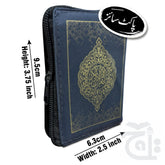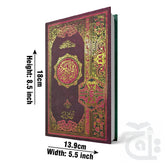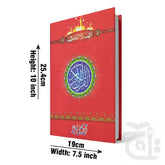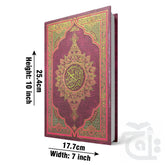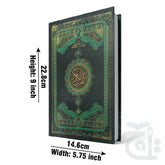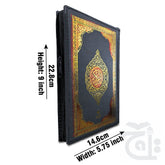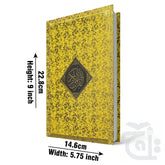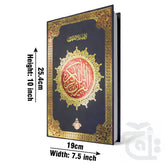



The Holy Quran, often referred to simply as the Quran, is the central religious text of Islam, believed by Muslims to be the word of Allah as revealed to the Prophet Muhammad over a period of approximately 23 years, beginning in 610 CE, when Muhammad was 40, and concluding in 632 CE, the year of his death. It is considered by Muslims to be the culmination and final revelation of a series of divine messages that were delivered to various prophets throughout history, including Adam, Abraham, Moses, and Jesus, among others. The Quran is divided into 114 chapters, called surahs, which vary in length and cover a wide range of topics, including theology, morality, guidance for personal conduct, social justice, and laws governing various aspects of human life. Each surah is composed of verses, known as ayahs, which are written in classical Arabic and are characterized by their rhythmic prose and eloquent language. One of the distinctive features of the Quran is its preservation and transmission. Muslims believe that the Quran has been perfectly preserved since the time of its revelation, with every word, letter, and verse remaining unchanged over the centuries. The Quran has been memorized by millions of people around the world, and even today, there are countless individuals known as hafiz (plural huffaz) who have committed the entire text to memory. The 13 Line Hafizi Quran refers to a specific style of Quranic text layout, where each page contains 13 lines of text. This layout is commonly used in Quranic manuscripts and printed editions, particularly in the Indian subcontinent. The text is carefully formatted to ensure readability and ease of memorization, with each verse clearly delineated and numbered. Throughout the Islamic world, the Quran holds a central and revered position in the lives of Muslims. It is not only recited and memorized but also studied extensively for its spiritual guidance and wisdom. Muslims believe that the Quran contains the ultimate truth and guidance for all aspects of life, and its teachings form the foundation of Islamic faith and practice. Beyond its religious significance, the Quran has also had a profound influence on literature, art, and culture throughout history. Its language and imagery have inspired countless poets, writers, and artists, and its message of peace, justice, and compassion continues to resonate with people of all backgrounds and beliefs. In summary, the Holy Quran, in its 13 Line Hafizi format or otherwise, stands as a timeless and profound testament to the beliefs, values, and teachings of Islam. Its enduring relevance and influence make it not only a sacred scripture for Muslims but also a source of inspiration and wisdom for people around the world.
Feature Holy Quran(13 Line Hafizi)
Paper Quality Imported Offset
Language Arabic
Binding Special Lamination
Feature Holy Quran(13 Line Hafizi)
Paper Quality Imported Offset
Language Arabic
Binding Special Lamination
- Choosing a selection results in a full page refresh.


